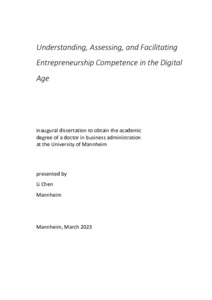|
Understanding, assessing, and facilitating entrepreneurship competence in the digital age
Chen, Li
![[img]](https://madoc.bib.uni-mannheim.de/65088/1.hassmallThumbnailVersion/Understanding%2C%20Assessing%2C%20and%20Facilitating%20Entrepreneurship%20Competence%20in%20the%20Digital%20Age.pdf)  Vorschau |
|
PDF
Understanding, Assessing, and Facilitating Entrepreneurship Competence in the Digital Age.pdf
- Veröffentlichte Version
Download (3MB)
|
|
URN:
|
urn:nbn:de:bsz:180-madoc-650886
|
|
Dokumenttyp:
|
Dissertation
|
|
Erscheinungsjahr:
|
2023
|
|
Ort der Veröffentlichung:
|
Mannheim
|
|
Hochschule:
|
Universität Mannheim
|
|
Gutachter:
|
Ifenthaler, Dirk
|
|
Datum der mündl. Prüfung:
|
9 Mai 2023
|
|
Sprache der Veröffentlichung:
|
Englisch
|
|
Einrichtung:
|
Fakultät für Betriebswirtschaftslehre > Wirtschaftspädagogik, Technologiebasiertes Instruktionsdesign (Ifenthaler 2015-)
|
|
Lizenz:
|
 Creative Commons Namensnennung 4.0 International (CC BY 4.0)
Creative Commons Namensnennung 4.0 International (CC BY 4.0)
|
|
Fachgebiet:
|
650 Management
|
|
Freie Schlagwörter (Englisch):
|
entrepreneurship , entrepreneurship education , entrepreneurship competence , educational technology , digital
|
|
Abstract:
|
Entrepreneurship and entrepreneurship education become mainstream inside and outside business schools after scholarships and educators from this field made efforts in the past two decades. Nutrition of entrepreneurship competence is an emergency task for the economy and society especially during economic shock and uncertainty. Digital entrepreneurship competence brings new possibilities for learners living in this digital world. This study facilitates digital entrepreneurship and digital entrepreneurship competence as 21st-century skills at the higher education level, experimenting in Chinese universities and colleges. In addition, this research will help stakeholders in Germany and other countries whose learners lack such knowledge and skills. I propose a methodology set consisting of three main ingredients. Initially, a systematic review was undertaken by the researcher in collaboration with two educators who specialized in entrepreneurship theories and practice to extract insights on the utilization of educational technologies in the context of entrepreneurship education. In response to the current trend of educational technology, a comprehensive examination was conducted to scrutinize the regulations and potential of AI within entrepreneurship learning and teaching. Secondly, the present study endeavored to assess the effectiveness of virtual team learning in online entrepreneurship education during the COVID-19 pandemic, taking into consideration the dimensions of teamwork, taskwork, and information and communication technology. In the final investigation, a digital entrepreneurship training program was administered through an online platform, with the aim of obtaining both quantitative and qualitative feedback regarding the program’s effectiveness and assessing the participants’ digital entrepreneurship competence. The following presents a summary of each study:
Regarding the systematic review on the utilization of educational technologies in entrepreneurship education, Study 1 uncovered that social media, serious games, and digital platforms emerged as three prominent technological approaches. In light of extensive application of artificial intelligence in various educational domains, Study 2 delved into its utilization within the context of entrepreneurship education. The findings indicated the prevalence of machine learning, big data analysis, and adaptive learning systems in this field. Meanwhile, the investigation identified potential prospects for the integration of natural language processing and chatbots in entrepreneurship teaching and learning.
I evaluated online entrepreneurship education courses, supported by virtual teams from existing freely available learning content and multimedia materials. Evaluation of the content and materials is whether they fit the needs of educators and learners with various demographic backgrounds. Specifically, we evaluated the influence of gender and other demographic backgrounds on virtual team learning and its impact on entrepreneurship competence.
Furthermore, experiential learning in online settings was explored in the field of entrepreneurship, focusing on the evaluation of an online practical entrepreneurship training program using the digital entrepreneurship competence framework. The research showed that digital opportunity identification competence is apparently improved from a complete novice to a nascent entrepreneur who understands the theory and practice of digital entrepreneurship. However, the effectiveness of online practical learning is limited because of participants’ isolation. If possible, tutorials and project guides are conducted online whereas experiential learning is partly moved into face-to-face contexts.
To analyze entrepreneurship competence in the digital age, this thesis construct and discuss theoretical frameworks, namely entrepreneurship education, educational technology, and digital entrepreneurship competence. The current studies seldom analyze entrepreneurship competence in online entrepreneurship education programs. Therefore, this research attempts to understand, assess, and facilitate entrepreneurship competence and digital entrepreneurship competence in the digital age. The thesis consists of two qualitative studies (Study 1 and 3) and two quantitative studies (Study 2 and 4).
This research aims to offer valuable insights for developing countries engaging in entrepreneurship education with limited resources, enabling the younger generation to navigate the path of venture creation. It holds practical and theoretical implications, establishing a solid foundation for online entrepreneurship education and fostering digital entrepreneurship competence. It is hoped that this thesis will inspire scholars and policy-makers to actively contribute to this field and work collaboratively.
|

 | Dieser Eintrag ist Teil der Universitätsbibliographie. |
 | Das Dokument wird vom Publikationsserver der Universitätsbibliothek Mannheim bereitgestellt. |
 Suche Autoren in Suche Autoren in
BASE:
Chen, Li
Google Scholar:
Chen, Li
Sie haben einen Fehler gefunden? Teilen Sie uns Ihren Korrekturwunsch bitte hier mit: E-Mail
Actions (login required)
 |
Eintrag anzeigen |
|
